- Home
- Ellen Datlow
The Devil and the Deep
The Devil and the Deep Read online
Also Edited by Ellen Datlow
A Whisper of Blood
A Wolf at the Door (with Terri Windling)
After (with Terri Windling)
Alien Sex
Black Feathers: Dark Avian Tales
Black Heart, Ivory Bones (with Terri Windling)
Black Swan, White Raven (with Terri Windling)
Black Thorn, White Rose (with Terri Windling)
Blood is Not Enough: 17 Stories of Vampirism
Blood and Other Cravings
Children of Lovecraft
Darkness: Two Decades of Modern Horror
Digital Domains: A Decade of Science Fiction and Fantasy
Fearful Symmetries
Haunted Legends (with Nick Mamatas)
Haunted Nights (with Lisa Morton)
Hauntings
Inferno: New Tales of Terror and the Supernatural
Lethal Kisses
Little Deaths
Lovecraft Unbound
Lovecraft’s Monsters
Mad Hatters and March Hares
Naked City: Tales of Urban Fantasy
Nebula Awards Showcase 2009
Nightmare Carnival
Off Limits: Tales of Alien Sex
Omni Best Science Fiction: Volumes One through Three
Omni Books of Science Fiction: Volumes One through Seven
OmniVisions One and Two
Poe: 19 New Tales Inspired by Edgar Allan Poe
Queen Victoria’s Book of Spells (with Terri Windling)
Ruby Slippers, Golden Tears (with Terri Windling)
Salon Fantastique: Fifteen Original Tales of Fantasy (with Terri Windling)
Silver Birch, Blood Moon (with Terri Windling)
Sirens and Other Daemon Lovers (with Terri Windling)
Snow White, Blood Red (with Terri Windling)
Supernatural Noir
Swan Sister (with Terri Windling)
Tails of Wonder and Imagination: Cat Stories
Teeth: Vampire Tales (with Terri Windling)
Telling Tales: The Clarion West 30th Anniversary Anthology
The Beastly Bride: And Other Tales of the Animal People (with Terri Windling)
The Best Horror of the Year: Volumes One through Ten
The Beastly Bride: Tales of the Animal People
The Coyote Road: Trickster Tales (with Terri Windling)
The Cutting Room: Dark Reflections of the Silver Screen
The Dark: New Ghost Stories
The Doll Collection
The Del Rey Book of Science Fiction and Fantasy
The Faery Reel: Tales from the Twilight Realm
The Green Man: Tales of the Mythic Forest (with Terri Windling)
The Monstrous
Troll’s Eye View: A Book of Villainous Tales (with Terri Windling)
Twists of the Tale
Vanishing Acts
The Year’s Best Fantasy and Horror (with Terri Windling, Gavin J. Grant, and Kelly Link)
Copyright © 2018 by Ellen Datlow
All rights reserved. No part of this book may be reproduced in any manner without the express written consent of the publisher, except in the case of brief excerpts in critical reviews or articles. All inquiries should be addressed to Night Shade Books, 307 West 36th Street, 11th Floor, New York, NY 10018.
Night Shade books may be purchased in bulk at special discounts for sales promotion, corporate gifts, fund-raising, or educational purposes. Special editions can also be created to specifications. For details, contact the Special Sales Department, Night Shade Books, 307 West 36th Street, 11th Floor, New York, NY 10018 or [email protected].
Night Shade Books™ is a trademark of Skyhorse Publishing, Inc. ®, a Delaware corporation.
Visit our website at www.nightshadebooks.com.
10 9 8 7 6 5 4 3 2 1
Library of Congress Cataloging-in-Publication Data is available on file.
Cover artwork by Kevin Peterson
Cover design by Claudia Noble
Print ISBN: 978-1-59780-907-8
Ebook ISBN: 978-1-59780-908-5
Printed in the United States of America
Thanks to Stefan Dziemianowicz and to my editor, Jason Katzman.
TABLE OF CONTENTS
Introduction -- Ellen Datlow
Deadwater -- Simon Bestwick
Fodder’s Jig -- Lee Thomas
The Curious Allure of the Sea -- Christopher Golden
The Tryal Attract -- Terry Dowling
The Whalers Song -- Ray Cluley
A Ship of the South Wind -- Bradley Denton
What My Mother Left Me -- Alyssa Wong
Broken Record -- Stephen Graham Jones
Saudade -- Steve Rasnic Tem
A Moment Before Breaking -- A. C. Wise
Sister, Dearest Sister, Let Me Show to You the Sea -- Seanan McGuire
The Deep Sea Swell -- John Langan
He Sings of Salt and Wormwood -- Brian Hodge
Shit Happens -- Michael Marshall Smith
Haunt -- Siobhan Carroll
Acknowledgment of Copyright
About the Authors
About the Editor
INTRODUCTION
I grew up loving the ocean. My family went to New York’s Rockaway Beach for many summers when I was a child and through my teenage years. I loved the beach, lying on the sand, baking in the sun (pre-cancer scares) with my friends, the smell of the tar in the parking lots—and of the ocean—and body surfing in the waves. I also went fishing with my dad (in lakes and ponds), and even went on a deep-sea fishing trip with a friend in my early twenties (we caught nothing).
But in 1975, something happened. I went to see Jaws. It scared me so badly that I had a difficult time going into the ocean after that. For a (very) brief time, I was even fearful of lakes and swimming pools. Then, in 1977, The Last Wave was released, about the end of the world heralded by a tsunami on a coast of Australia. Those two movies made me realize that the sea and the simple act of swimming in it could be frightening, even terrifying.
We, like all other forms of life, come from the sea, and yet we’re intimidated by it. Why? One reason could be that the seas are more vast on our planet than the land we live on, and 95 percent of the sea is still unexplored. It’s a natural human tendency to fear the unknown, and our relative ignorance about the sea fosters superstitions, myths, and legends about it and what might inhabit it (sirens, sea monsters, forms of organic life that we can’t even begin to comprehend because the conditions in which they flourish are inimical to human life). H. P. Lovecraft populated the spaces between universes with extra-dimensional monsters, but he also populated the sea with them in The Shadow Over Innsmouth, a story that serves as a touchstone for a lot of horror fiction written since. Lovecraft, like numerous other writers (William Hope Hodgson in particular), saw in the vastness and alienness of the sea the same potential for horror that has persuaded writers since the dawn of the tale of horror to infest the dark with monsters and boogeymen. The sea is a watery terra incognita, a huge blank canvas that invites writers to imagine horrors onto it.
But, come on. In reality it’s only water, so why should we fear large bodies of it? Well, those sharks, especially the Great White—a predator’s dream, a swimmer or surfer’s nightmare. Also, those mysteries in the deep blue sea—awful mysteries like eons-old fish that shouldn’t exist today but apparently do. Then there are fish like the dragonfish, with its big teeth and hideous face and the black seadevil, with sharp teeth, both found in the deeps of the Mariana Trench.
Another aspect of what makes the sea so horrifying: it seems hostile to us (although, really, it’s as indifferent to human existence as Lovecraft’s monsters are). We’re of it, but we
can’t live in it. One can drown in a minimal amount of water, but it’s more likely that a riptide will drag unwary swimmers out to sea, or you might just develop a cramp, preventing you from getting back to shore with no lifeguard to save you.
We build ships to sail upon the ocean, deluding ourselves that we can master it, but shipwrecks prove that some of our sturdiest inventions are at the mercy of the sea. People (and sometimes vessels) lost at sea are often never found: the sea is like a vast ravening maw that can swallow us in one bite.
Remaining on shore is no guarantee of safety, either. If we stray too near the sea, it can pull us from our safe haven on land (sort of like the monster under the bed reaching up to grab us). And we’ve all witnessed the damage tsunamis can wreak on shorelines around the world, killing thousands. There’s a lot of talk about global warming these days, and the consequence: rising sea levels. As the sea encroaches on the world that we’ve built for ourselves, it has the potential to sweep away everything that human progress and civilization have created—everything that our species stands for. The sea coughed us up, but some day it’s going to reclaim us, and there’s precious little that we can do about it. We are puny. It is monstrously vast and overwhelming. It makes us realize that, on our planet, we are only temporary, while the sea is permanent.
The stories in The Devil and the Deep cover a range of aspects of the sea and the shores around it, from obvious monsters to the mysterious; there are tales of shipwrecks, haunts, monsters—human and inhuman—one story even taking place on what was once an inland sea, long gone. All these tales have been conjured up from the imaginations of the fifteen contributors. Each is basically about people, and how they deal with the mysterious entity surrounding us.
DEADWATER
SIMON BESTWICK
Above the sea, the railway ran; a hundred yards inland a 4x4 stood empty on a dirt track, keys still in the ignition. There was no one inside, no sign of a struggle, and no witnesses. That whole part of the coast is hills and empty fields, with the odd farmhouse hidden in bristling crops of pine.
A rainy sky, and the tide was in, the dull grey sea gnashing at the edge of the shingle beach.
The 4x4 belonged to one Robin Gaunt. Police Constable Lewis popped into the Harbour Café that morning to ask if I knew him. The Harbour’s the most popular café here—both locals and tourists love it. I’ve part-timed at half the other places in town, too—work here tends to be seasonal, so you take whatever’s going—which means there isn’t much I don’t hear about. Clive makes me his first port of call whenever he wants to know something. Fringe benefit of being his girlfriend, I suppose.
Around here people are like the tide: some flow in, some flow out. Ten, fifteen years ago there’d been an influx of New Age types, all coming to commune with Nature; Robin had been one of them. Now they were being displaced in their turn, by urban professionals buying second homes. Frankly, I was missing the hippies already.
I told Clive most of what I knew. Robin popped into the Harbour once or twice a week for a Full English or a sandwich, but didn’t have much motivation beyond getting high and saying “wow, man” at the scenery a lot. The scenery around here is pretty “wow”—we’re on a nice stretch of coast, with mountains all around—but after a while, you hardly notice it. Unless you’re like Robin.
We’d meet some evenings, when Clive was on nights. Look, I’m young and I get lonely. Around here, you find some company or you climb the walls. We smoked some weed—usually out in his car—and slept together twice. The first time we were stoned, and I was going through a bad patch with Clive. The second time was a mistake, and I told Robin it wouldn’t happen again. He accepted that, and my statement that I still wanted to be friends. Go with the flow was his philosophy: that was how he’d ended up here. And why I liked his company. He was easy-going, didn’t make demands. I told Clive none of this, of course. As a small-town copper, he tends to see things in black and white.
Clive had been to Robin’s rented cottage, but no one had answered the door. No, he hadn’t broken it down—this wasn’t the big city and all he had so far was an empty car. Robin had probably smoked too much draw and walked back into town instead of driving along the narrow, winding, ill-lit coastal roads. He was either at a friend’s house or so comatose he hadn’t heard Clive knock.
That didn’t sound right to me, even then. No matter how caned he was, some weird homing instinct always got Robin home at the end of a night. I didn’t know what it was—some sort of OCD, something that had happened to him—but he never felt safe under someone else’s roof, or in a strange bed. Similarly, anything like a knock on the door would snap him instantly awake, no matter what. But explaining how I knew that to Clive would have been awkward.
In the end, it made no difference. A few hours later, the tide went out, exposing the shingle beach. There’s an outfall pipe there, emptying fifty feet from the shore. Robin lay next to it, face-down, seaweed in his hair, arms outstretched towards one of the rusted iron struts holding the pipe in place. A pair of handcuffs were looped around it, fastened on his wrists. The pathologist said he’d still been alive when the tide came in.
“Must have been bloody horrible,” said Clive.
I stroked his hands. We were sitting at a table in a corner of the café. Technically I was at work, but it was a quiet day and Jeanette—the owner—likes being on good terms with the police.
“There’d be no one around to hear,” he said, “not that time of night—if he’d changed his mind, I mean. Even a train going by wouldn’t have seen him.”
This time of year, the tide takes about an hour to come in. An hour can seem very short or very long; I could guess which it would have been for Robin. Then I registered what Clive had said.
“Changed his mind?” I said. “You’re not saying he did that to himself?”
“Looks that way. Doesn’t seem to have had any enemies round here.”
“But he was handcuffed …”
Clive glanced round to ensure we weren’t overhead. “Just between us, Emily, okay?”
“Okay.”
“Gaunt was a known druggy. History of mental health problems. He’d tried topping himself two, three times before he came here. And you should have seen his forearms—Christ alive. Looked as if someone had been playing tic-tac-toe with a razorblade.”
I had seen them, but didn’t tell him. Robin had worn long-sleeved shirts, even in summer. He’d only taken them off in bed.
“Looks like he wanted to do himself in but kept bottling out. So he found a way to make sure. Cuff himself to the outfall, let the sea do the work. Like I said”—Clive took another sip of tea—“I hope he didn’t change his mind.”
Clive was working the night shift. Once I’d finished wiping down tables and serving customers, I went for a walk along the seafront.
The beach here is beautiful, but I prefer the far end of the promenade, where the yellow sand gives way to shingle and rock broken up by tall wooden groynes. It isn’t as pretty to look at or as nice to walk on, so there aren’t as many people. Not that there were many today in any case; it was raining—lightly, but enough to keep away the day trippers. That was why the Harbour Café had been so quiet that afternoon.
Normally, an evening like this, with no Clive to snuggle up with in front of the TV, I would have gone over to Robin’s for a coffee, maybe gone out with him for a spliff. But of course I couldn’t do that now.
It’s the absences that get you, with any death. The gaps, the depths, the holes people leave behind: they’re what we mean by ghosts.
I got to the end of the sea wall and looked up the rocky beach that stretched away beyond it. The small, shallow cove where Robin had died was about two miles to the north.
A druggy, a self-harmer, a mental case. That was the pigeon-hole Clive had put Robin in. He really had no idea, but that was my fault. There was a lot he didn’t know about me. I’d cut more carefully than Robin had, back in the day. My cuts had either healed with
out scarring, or the scars were where Clive hadn’t yet found them. And he wondered why he’d never made CID.
Not that they were any better. They’d put Robin in the same box. A suicide, because that’s the way the damaged and the broken are meant to go, if they’ve any decency. Take their mess and awkwardness out of everyone else’s life. And of course, we often do. Maybe I would one day, if the dark ever welled up in me again and I found no way to drain it off. Maybe Robin had.
But I didn’t think so. I might be wrong, of course; there were any number of reasons why I wouldn’t want to think it. All I had, really, was a feeling, and I couldn’t share the little I had to back it up with the one copper who might listen. More absences. More holes, more ghosts, more deeps.
There’s a little café at the end of the sea wall. It’s nowhere near as pretty or popular as the Harbour, but they get by. A quiet, friendly Kurdish guy called Hish runs it. He makes good coffee, so I went in.
“Emily. You’re well?” He took a closer look at me. “Ah. I see. No.”
“Did you know Robin?”
“Robin?”
I described him. Hish nodded, sighed. “Yes. Was he the one who drowned?” I nodded. “A friend of yours?”
“Yeah.”
I didn’t say anything else. Hish looked down. “You want some hummus?” he said. He’s not the most expressive guy. His first response to any situation is to do something practical, usually food related. That’s okay, though. He’s a good cook.
“Thanks,” I said.
The hummus came with a plate of toasted pita strips. I ate slowly, sipping coffee and watching as it got dark. It wouldn’t be hard to ask around, maybe see if I could dig something up, enough that Clive might take a closer look at Robin’s death. The worry was, as always, what else might get stirred up in the process.
I’m good at compartmentalising; I like to keep things well ordered. Things, and information: about me, in particular. There was plenty Clive didn’t know, and his uncovering one thing might quickly bring others to light. And what then?
I wasn’t that different from Robin, really. People break in different ways and places, and have different ways of coping. Robin’s and mine had been much the same: find a place to hide, and hide there.

 Inferno
Inferno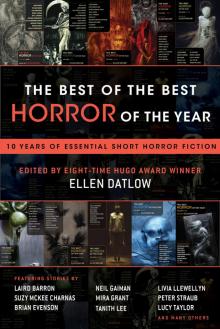 The Best of the Best Horror of the Year
The Best of the Best Horror of the Year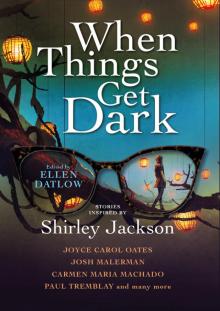 When Things Get Dark
When Things Get Dark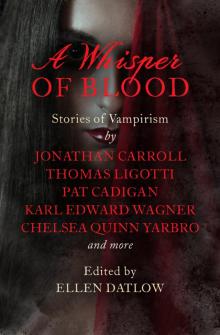 A Whisper of Blood
A Whisper of Blood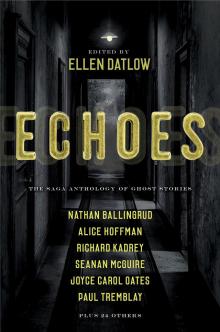 Echoes
Echoes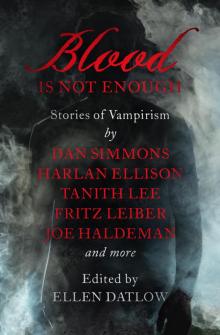 Blood Is Not Enough
Blood Is Not Enough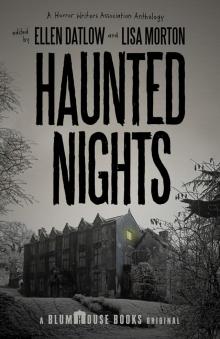 Haunted Nights
Haunted Nights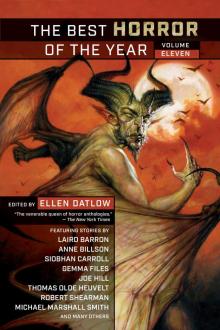 The Best Horror of the Year Volume Eleven
The Best Horror of the Year Volume Eleven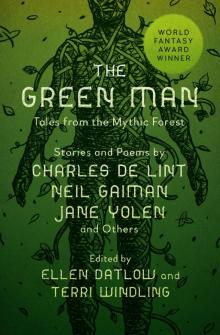 The Green Man
The Green Man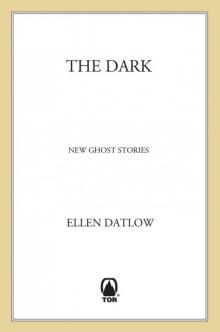 The Dark
The Dark Mad Hatters and March Hares
Mad Hatters and March Hares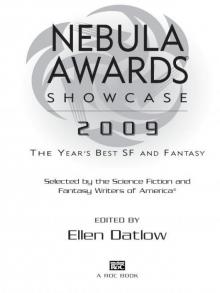 Nebula Awards Showcase 2009
Nebula Awards Showcase 2009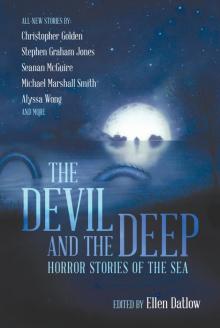 The Devil and the Deep
The Devil and the Deep